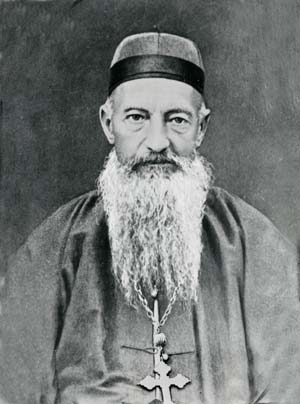Due to tornado damage in Jefferson City, officials repackaged
the two-day State track meet into a single in Columbia. Following the final 400-meter event in
Missouri heat and humidity, I raced to St. Meinrad, Indiana, home of the
Benedictine Archabbey and seminary where I’d once studied. The aftermath of glowing fireflies smeared my
buggy windshield. My wife and I arrived late
at the abbey’s guest quarters. Tomorrow,
we’d celebrate five jubilarians, two of 25 years and three of 50 years.
I’d
traveled to celebrate Fr. Eugene Hensell OSB in thanksgiving for 50 years of
service. My favorite, yet extremely
challenging scriptures professor, Fr. Eugene introduced himself as a teacher
who’d “turn my world upside down.” And
that he did. So much so, that my only
year in the seminary has been and continues to be one of the most impactful
years of my life. He let me know he was
not teaching to bring me prosperity or to give me answers, but to assist me
along my journey to live in paradox, to discover mysteries along the way, and
to build relationships in community and with the Father. He served as my spiritual director while in
attendance. His wisdom continues to
offer me guidance with essential questions in his letters and conversations.

Rising
early, I stroll the Archabbey-Seminary grounds.
From the guest quarters, I wander through the cemetery. Perfectly aligned homogenous stone crosses
mark where former teachers, woodworkers, printers, farmers, all brothers laid
to rest in simple pine boxes. Several
names I’d recognized had been called home by the Father. Some I recalled their struggles with aging,
others their labors, but all I pictured moments of thoughtfulness and compassion. Where does the time go?
Nestled in Hoosier National Forest,
St. Meinrad, a township of fewer than two hundred resides along the northern
border of the Appalachians where poverty claims so many. Our Lady of Einsiedelm monastic chapel towers
over a vast forested valley. A
Benedictine offshoot from Einsiedelm, Switzerland, St. Meinrad Archabbey has
educational roots across the country. I
escape the gnats, rising heat and humidity.
The monastic chapel offers a refreshing cool breeze. I jot notes on the back of a State track
schedule. (Matthew Kelly recommends
recording one influential point from Mass each time one attends. I confess, I’ve torn the occasional page from
a missalette for notes.)
A grandfather escorts his
inquisitive granddaughter around the brightly colored church. I overhear a visitor speaking of his recent
layoff from work he’d taken great pride.
Discreetly, elder monks maneuver their scooters near the altar.

No cameras, no fanfare, no program.
The essence, gratitude, recollections, resonance is celebrated in the Eucharist
in unity with guests. Gregorian chant
ushers the community of monks to their places.
Facing each other, they sit for the initial reading.
The gospels during Holy Week and
during the Easter season come from John’s farewell discourse. First there is the shock … Jesus washes his
disciples’ feet, announces he will be leaving soon, … many betray him. The Passion quickly follows, resurrection, and
ascension into heaven. Jesus reveals the
gift of the Advocate.
This Jubilee Mass is the Sunday
before the feast of the Ascension.
“I have told you this while I am with you. The Advocate, the Holy Spirit, whom the
father will send in my name, will teach you everything and remind you of all
that I told you. Peace I leave with you;
my peace I give to you. Not as the world
gives do I give it to you. Do not let
your heart be troubled or afraid.” (John 14:25-27)
Jesus had just walked through a
locked door, delivered peace, offered forgiveness, bestowed the baptism of the
Holy Spirit. Before Jesus leaves for his
kingdom, he tells his disciples to go and be my witnesses. Jesus then departs with the door forever ajar.
“Pray
for me that God may put his word on my lips, that I may courageously make known
the mystery of the gospel; that mystery for which I am an ambassador. Pray that I may have courage to proclaim it as
I ought.” (Ephesians 6:19-20)
An ambassador he is. And proclaim the Word, he has. Congratulations! 50 years jubilarian! Very unassuming, more embarrassed than
jubilant, Fr. Eugene’s smile opened beneath his gray beard. “One of the advantages of getting old.” He meets people where they are. The last time we met and I’d invited him to a
meal, Eugene selected, of all places, a Denny’s truck stop just off I-64.
Eugene travels extensively after
years of service teaching scriptures in theology. Serving as seminary president/rector, he instructed,
informed, counseled, and directed students.
His body may have slowed, yet this theologian remains deliberate on
God’s calling and commitment. Against
many odds, he’s persevered with wisdom and gratitude delivering thoughtful,
challenging retreats.
Many describe Eugene as a prophet, skillfully
turning one’s perspective upside down and then re-righting the ship to new
revelations stimulating growth; encouraging one to reevaluate, strengthen their
commitment to God in tending to his people and His creation.
Far from hell and brimstone,
Eugene’s delivery is an unsettling, pervasive whisper of thoughtful, enduring
hope. Often in the storms of life, well
beyond one’s comfort zone, his words shock an arrhythmic soul, resetting its
beat with some nurturing. He blesses one
upon their journey revived, refreshed.
Fr. Eugene gives me a more profound
appreciation for our own shepherds that should not be conserved for jubilees. With courage and gratitude daily, Fathers
Stanger, Dieckmann, and Burkemper usher the baptism of the Holy Spirit through
locked doors. They teach, guide, and
encourage us to be the eyes, hands, feet, heart of Christ; delivering peace,
offering forgiveness, mercy. They remind
us as we ought to be disciples and witness.
The door is ajar! The Advocate is upon us!
The father who knows best looks to the Father who knows all!








